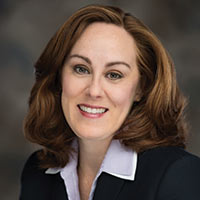Merrill Lynch Wealth Management partnered with Age Wave to conduct the study Women and Financial Wellness: Beyond the Bottom Line, taking an in-depth look at the long-term financial security of women.
West Michigan Woman sat down with Renee C. Tabben, Director, Merrill Lynch Wealth Management Market Executive, Bank of America Market President, to discuss the study's findings.
Why was this study conducted?
Women's financial wellness is at a tipping point. Although women have made historic strides both personally and professionally, they still have a long way to go when it comes to ensuring personal long-term financial security. The purpose of this study was to gain a better understanding of the financial circumstances women face, from superior longevity to higher lifetime health costs—and provide women with meaningful strategies and action steps for achieving more financial wellness customized to their life stage, priorities, experiences and needs.
What would you say is the key takeaway from this study?
What really struck me is the wealth gap and how it compounds over a lifetime. According to the study, the cumulative difference in earnings between a man who works full time without breaks and a woman who takes breaks to provide care for children or family members can total more than $1 million.
On top of that, women, on average, live longer than men: 80 percent of women are alone in their final years of life. This makes it even more imperative for women to be financially self-sufficient.
Did the study identify any significant differences in how men and women approach finances?
Women have confidence in all financial tasks—except investing. For most financial tasks, such as bill paying, budgeting, and paying off debt, men and women are equally confident. However, only 52 percent of women say they feel confident in managing investments, versus 68 percent of men.
On a related note, women say their top financial regret is not investing more of their money. For the women who do invest, 77 percent feel they will be able to accumulate enough money to support themselves for life.
What can women do to better prepare financially?
First off, be purposeful about financial education. Seek out financial information, ask questions and engage in discussions about money. This may be harder than it sounds. Women view discussing money as a social taboo: 61 percent would rather talk about their own death than talk about money, according to the study.
Additionally, plan early and ensure your plan accounts for the financial challenges women typically face, such as career interruptions, higher healthcare costs, and a longer life to fund, and make course corrections along the way.
Last, be an advocate for yourself and the women in your life. Be or seek a mentor. Our study found that baby boomers and silent generation women are more financially confident than younger generations, indicating a valuable opportunity for younger generations to learn from their experiences.
Visit www.ml.com/women-investors for more helpful information. For additional details, please contact the Merrill Lynch Grand Rapids office at 616.774.4200 or [email protected].
Edited by Amy L Charles, Editorial Director for West Michigan Woman.
 Renee C. Tabben, Director, Merrill Lynch Wealth Management Market Executive, Bank of America Market President.
Renee C. Tabben, Director, Merrill Lynch Wealth Management Market Executive, Bank of America Market President.




